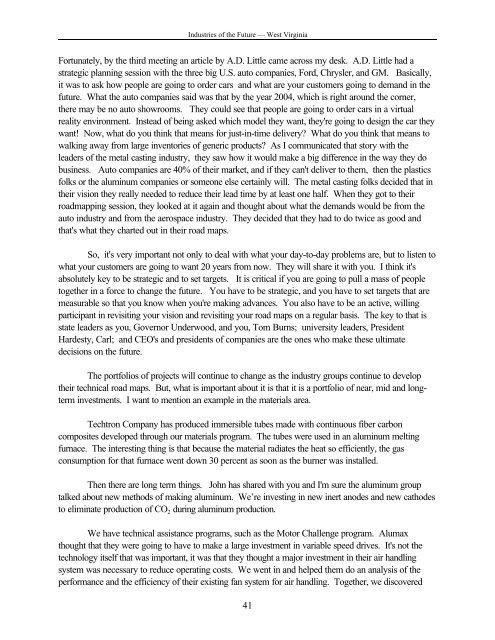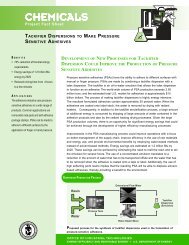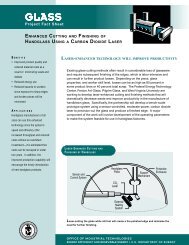PROCEEDINGS - Industries of the Future - West Virginia - West ...
PROCEEDINGS - Industries of the Future - West Virginia - West ...
PROCEEDINGS - Industries of the Future - West Virginia - West ...
Create successful ePaper yourself
Turn your PDF publications into a flip-book with our unique Google optimized e-Paper software.
<strong>Industries</strong> <strong>of</strong> <strong>the</strong> <strong>Future</strong> — <strong>West</strong> <strong>Virginia</strong><br />
Fortunately, by <strong>the</strong> third meeting an article by A.D. Little came across my desk. A.D. Little had a<br />
strategic planning session with <strong>the</strong> three big U.S. auto companies, Ford, Chrysler, and GM. Basically,<br />
it was to ask how people are going to order cars and what are your customers going to demand in <strong>the</strong><br />
future. What <strong>the</strong> auto companies said was that by <strong>the</strong> year 2004, which is right around <strong>the</strong> corner,<br />
<strong>the</strong>re may be no auto showrooms. They could see that people are going to order cars in a virtual<br />
reality environment. Instead <strong>of</strong> being asked which model <strong>the</strong>y want, <strong>the</strong>y're going to design <strong>the</strong> car <strong>the</strong>y<br />
want! Now, what do you think that means for just-in-time delivery? What do you think that means to<br />
walking away from large inventories <strong>of</strong> generic products? As I communicated that story with <strong>the</strong><br />
leaders <strong>of</strong> <strong>the</strong> metal casting industry, <strong>the</strong>y saw how it would make a big difference in <strong>the</strong> way <strong>the</strong>y do<br />
business. Auto companies are 40% <strong>of</strong> <strong>the</strong>ir market, and if <strong>the</strong>y can't deliver to <strong>the</strong>m, <strong>the</strong>n <strong>the</strong> plastics<br />
folks or <strong>the</strong> aluminum companies or someone else certainly will. The metal casting folks decided that in<br />
<strong>the</strong>ir vision <strong>the</strong>y really needed to reduce <strong>the</strong>ir lead time by at least one half. When <strong>the</strong>y got to <strong>the</strong>ir<br />
roadmapping session, <strong>the</strong>y looked at it again and thought about what <strong>the</strong> demands would be from <strong>the</strong><br />
auto industry and from <strong>the</strong> aerospace industry. They decided that <strong>the</strong>y had to do twice as good and<br />
that's what <strong>the</strong>y charted out in <strong>the</strong>ir road maps.<br />
So, it's very important not only to deal with what your day-to-day problems are, but to listen to<br />
what your customers are going to want 20 years from now. They will share it with you. I think it's<br />
absolutely key to be strategic and to set targets. It is critical if you are going to pull a mass <strong>of</strong> people<br />
toge<strong>the</strong>r in a force to change <strong>the</strong> future. You have to be strategic, and you have to set targets that are<br />
measurable so that you know when you're making advances. You also have to be an active, willing<br />
participant in revisiting your vision and revisiting your road maps on a regular basis. The key to that is<br />
state leaders as you, Governor Underwood, and you, Tom Burns; university leaders, President<br />
Hardesty, Carl; and CEO's and presidents <strong>of</strong> companies are <strong>the</strong> ones who make <strong>the</strong>se ultimate<br />
decisions on <strong>the</strong> future.<br />
The portfolios <strong>of</strong> projects will continue to change as <strong>the</strong> industry groups continue to develop<br />
<strong>the</strong>ir technical road maps. But, what is important about it is that it is a portfolio <strong>of</strong> near, mid and longterm<br />
investments. I want to mention an example in <strong>the</strong> materials area.<br />
Techtron Company has produced immersible tubes made with continuous fiber carbon<br />
composites developed through our materials program. The tubes were used in an aluminum melting<br />
furnace. The interesting thing is that because <strong>the</strong> material radiates <strong>the</strong> heat so efficiently, <strong>the</strong> gas<br />
consumption for that furnace went down 30 percent as soon as <strong>the</strong> burner was installed.<br />
Then <strong>the</strong>re are long term things. John has shared with you and I'm sure <strong>the</strong> aluminum group<br />
talked about new methods <strong>of</strong> making aluminum. We’re investing in new inert anodes and new cathodes<br />
to eliminate production <strong>of</strong> CO 2 during aluminum production.<br />
We have technical assistance programs, such as <strong>the</strong> Motor Challenge program. Alumax<br />
thought that <strong>the</strong>y were going to have to make a large investment in variable speed drives. It's not <strong>the</strong><br />
technology itself that was important, it was that <strong>the</strong>y thought a major investment in <strong>the</strong>ir air handling<br />
system was necessary to reduce operating costs. We went in and helped <strong>the</strong>m do an analysis <strong>of</strong> <strong>the</strong><br />
performance and <strong>the</strong> efficiency <strong>of</strong> <strong>the</strong>ir existing fan system for air handling. Toge<strong>the</strong>r, we discovered<br />
41






